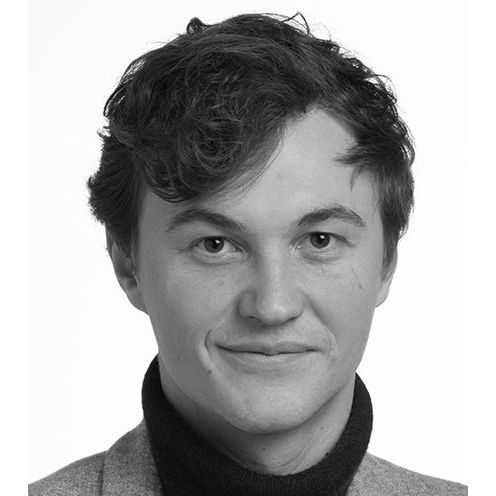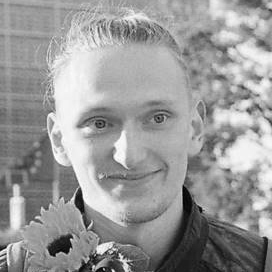On 8th and 9th October 2022, activists from the Code Rouge/Rood coalition in Belgium protested against the fossil fuel industry, in particular the multibillion-euro petroleum company TotalEnergies. During the action, over 1000 activists blocked TotalEnergies’ sites in Feluy and Liège by occupying railway tracks and roads near TotalEnergies’ depots. The protest caused the company to temporarily shut down their entire activities in Belgium.
But who are the people behind ‘Code Rouge’? Why was ‘Code Rouge’ protesting against TotalEnergies and the fossil fuel industry? And why are more and more people using civil disobedience as a tool to stand up against the climate crisis, the energy crisis and poor workers’ rights?
The Greens/EFA MEP, Malte Gallée, joined the protesters that weekend as a parliamentary observer. After the action, he sat down with our climate campaign intern, Michael, to talk about what he saw.

Malte Gallée is a Greens/EFA MEP from Germany. He fights for climate protection and for a sustainable industry. He is also the youngest MEP in Brussels.

Michael Staniszewski is a Fridays for Future (FFF) climate justice activist from Germany. He worked on the movement’s #NotMyTaxonomy campaign and actions.
Why use civil disobedience against the climate crisis?
Michael: You accompanied the non-violent mass civil disobedience action “Code Rouge/Rood” as a parliamentary observer. Have you ever witnessed a protest like this before?
Malte Gallée MEP: I have actually never actively participated in this kind of action before. But I was involved in supporting logistics during an action by “Ende Gelände” [the German climate justice movement calling for an end to coal power], where they blocked coal infrastructure in Germany. So I do know and value this form of protest. As a parliamentary observer at Code Rouge/Rood, I had to monitor closely what both the activists and the police were doing.
Michael: Talking about Ende Gelände, we hear that there can be some police violence and repression against peaceful activists. How was it at the Code Rouge/Rood protest?
Malte Gallée MEP: I was extremely surprised by how well the action went. I was very glad that there were no repressions from the police. I didn’t see any and I was also not notified of police brutality.The activists and the police were just looking at each other.
Michael: Can you tell us a bit about the people protesting at Code Rouge/Rood?
Malte Gallée MEP: That is the second thing that surprised me in a very positive way! The activists represented a broad spectrum of society. From 18-year-olds to pensioners, it was a wild mix of people that were blocking the destructive and exploitative interests of TotalEnergies. It was a truly intergenerational protest.
Michael: That’s what intergenerational justice is all about: recognising that young people will suffer longer from the consequences of the climate crisis. It’s nice to see that there was so much solidarity between younger and older people at the Code Rouge protest. Why do you think such protests are necessary and needed?
Malte Gallée MEP: These kinds of actions show how vulnerable and problematic large scale fossil fuel infrastructure is. An excellent example are the Nord Stream pipelines in the Baltic Sea, which have been damaged by suspected sabotage. It shows that energy dependency makes us more vulnerable to violence and war. Protesting against our dependency on fossil fuels can send an important signal that the energy production of the future has to be decentral and renewable. Young generations deserve a liveable future. They should be able to defend this right through protest.
The truth about TotalEnergies – human rights violations and the East African Crude Oil Pipeline
Michael: I saw that you were part of a group of MEPs that travelled to Uganda this summer to talk with local people affected by the East African Crude Oil Pipeline (EACOP) project planned by TotalEnergies. What did you experience in Uganda and is this linked to the Code Rouge/Rood action in any way?
Malte Gallée MEP: Yes, there is definitely a connection, especially as the Code Rouge/Rood protest directly addressed TotalEnergies. I think it is important to take a position against the EACOP project. We need to stand in solidarity with the people affected by it. This is what Code Rouge/Rood did. I wanted to use my privilege as a MEP to guarantee that peaceful protest against TotalEnergies can take place.
“The Ugandan system is very repressive. The people in the country suffer massively under Total’s activities. They are displaced from their land.”
In Uganda, however, the situation is totally different. The Ugandan system is very repressive. President Museveni has been in power since 1986. The people in the country suffer massively under Total’s activities. They are displaced from their land. Total refuses to pay reparations and if they speak up against EACOP, they are extorted, arrested or receive death threats. TotalEnergies is denying all of this, which is why it was especially important for us to be present and document it.
Recently, the police there arrested a group of students after they protested peacefully in front of the European Liaison Office, trying to hand over a presentation. The police took their phones and I saw terrible pictures of them being beaten into police trucks. It is frightening to see. I want to defend the right to protest everywhere and this is why I wanted to be a parliamentary observer.
Why are European fossil fuel companies exploiting African countries?
Michael: Ultimately, the pipeline is there to transport crude oil out of Uganda to be able to export it for the international market. The profits of this will mainly go to rich shareholders of TotalEnergies in Europe. Does that sound neo-colonialist to you too?
Malte Gallée MEP: Absolutely! There is actually a law in Uganda to prohibit these particular practices. The law makes it illegal to export raw materials, which is unfortunately still a huge problem for many African nations. They serve as providers for raw materials without local value creation happening. This means that the raw materials are not processed further on a local level, so local people are not able to profit from them.
But somehow the Ugandan government forgot that crude oil is also a raw material. So TotalEnergies is proceeding with its neo-colonial and imperialist practices on the ground.
What can the European Parliament do against the EACOP project?
Michael: I think the documented human rights violations speak for themselves, unfortunately. Is there a way the EU or the European Parliament can do something against the EACOP project? After all, TotalEnergies is a company based in Europe and should stand for European rights and values.
Malte Gallée MEP: I agree! In France, there is a law regulating the supply chain to make sure companies do not violate human rights. Because of this, the French court has the authority to prohibit TotalEnergies’ projects until they solve those problems. We are working on a similar law at European level. We need a European law that guarantees European companies will commit to protecting human rights outside of Europe.
Michael: Recently, the European Parliament adopted a resolution on the EACOP project, condemning the human rights violations and putting pressure on TotalEnergies. Does TotalEnergies care about their human rights violations?
Malte Gallée MEP: TotalEnergies is trying to greenwash the whole project. They are advertising it as the climate friendliest pipeline in the world. It makes no sense! It’s a pipeline! Its whole purpose is to transport oil, which will be burned and end up in the atmosphere.
But, slowly, TotalEnergies is getting nervous. They recently told the Ugandan government that they should respect human rights in a letter. What happened? Two days later, the government arrested some peaceful student protesters. I can well imagine why TotalEnergies’ CEO, Patrick Pouyanné, refused to come to the European Parliament to answer our questions. It would have been a disaster for him.
I would love to ask him: Thank you for the letter Patrick, but what about taking responsibility for TotalEnergies’ actions? Ultimately, you are the one who could do something about them. What about that?
Workers’ rights – Climate activists and the European Parliament need to stand in solidarity with TotalEnergies’ workers
Michael: Another thing that makes me furious is that TotalEnergies made around $10 billion profit this year – and still they are not paying their workers properly. This is why Code Rouge/Rood has been standing in solidarity with the workers’ strikes in France. The strikers are demanding a 10% increase in wages to be able to cope with inflation and higher energy costs. Due to the strikes, many petrol stations around Paris have run dry, causing long queues in front of them. It is obvious that we, as climate activists, have to keep the pressure up. Talking about these issues on social media or in our social environment is a first step. What else could we do to put pressure on TotalEnergies, while showing solidarity with the striking workers?
“One of the most valuable things we have in our democracy is peaceful protest!”
Malte Gallée MEP: One of the most valuable things we have in our democracy is peaceful protest! We should use this privilege to contribute to the debate and take a position against Total. Of course, you can boycott Total. But we can’t solve these issues by putting the responsibility on the individual. It is the job of politicians to end our dependence on fossil fuels, for the people and the planet. This is what we are working on as the Greens/EFA group.
Do you want to do something against the greed of fossil fuel companies and their neo-colonial practices? Do you want to speak up for human and workers’ rights? Come and join us on Sunday 23rd October on the streets of Brussels for the big Climate March. The demonstration will start at 13h at Brussels North Station. The Greens/EFA Group will be present with flags and posters. We’d love to see you there!
You can find all other articles from climate activists about climate activism here.